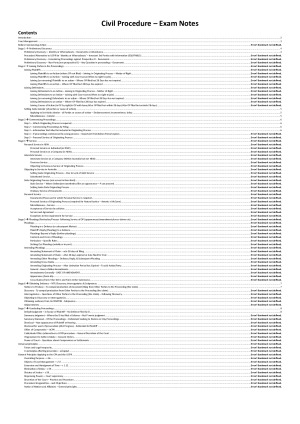Civil Procedure - EXAM NOTES - extensive problem question guide (high distinction)
Subject notes for UOW LLB3300
Description
High Distinction Civil Procedure Full Course Notes. These notes are in step-by-step format for every possible question in the final exam, covering all content learned throughout the course length. Table of Contents - Introduction to Civil Procedure: Defining procedural law, its purposes, and main authorities (CPA, UCPR). - Case Management & Guiding Principles: Overriding purpose (just, quick, cheap resolution), objects of case management, dictates of justice, elimination of delay, and proportionality of costs, including court directions and case types/divisions. - Before Commencing Action: Jurisdiction (inherent, implied), limitation periods for various actions (contract, tort, personal injury, defamation, etc.), and preliminary steps like preliminary discovery. - Preliminary Discovery: Orders for identity/whereabouts (r UCPR), equitable alternatives for innocent third parties, and discovery to decide whether to commence proceedings against a prospective defendant (r UCPR) or from a non-party (r UCPR). - Joining Parties in Proceedings: Principles of joinder for plaintiffs and defendants (as of right or with court leave), considerations for granting leave, and procedures for amending originating processes, including setting aside joinder. - Joining Causes of Action: Rules for joining multiple causes of action (as of right or with leave) at different stages of proceedings. - Miscellaneous Joinder Provisions: Court's power to join or remove parties, joinder on application of a third party, and consolidation of proceedings. - Commencing Proceedings: Determining the correct originating process (Statement of Claim or Summons), filing procedures, required information in the originating process, and consequences of commencing with the wrong process. - Service of Documents: Personal service in NSW (on individuals and companies), interstate service (SEPA application), overseas service (Hague Convention and non-Convention countries), objecting to service, and substituted service. - Stale Originating Process: Validity period, consequences of stale service (appearance vs. non-appearance), and procedures for setting aside stale processes or extending time for service. - Pleadings & Particulars: Defence requirements, plaintiff's reply, subsequent pleadings, content and form of pleadings, specific particularisation rules (fraud, negligence, damages), and procedures for striking out or amending pleadings. - Appearance & Cross Claims: How to enter an appearance, time limits, effects of appearance (waiver of objection), withdrawal of appearance, right to cross-claim (against plaintiff, other parties), time limits, and procedures for cross-claims. - Obtaining Evidence (Pre-Trial): Notices to Produce (compelling documents from other parties), Discovery (court-ordered production from other parties), Interrogatories (questions to other parties), and Subpoenas (obtaining evidence from third parties). - Adjournments: Court's power to adjourn proceedings and relevant considerations guided by the CPA and UCPR. - Concluding Proceedings (Summary Disposal): - Default Judgment: Obtaining judgment when the defendant fails to file a defence (for unliquidated and liquidated claims), and procedures for setting aside default judgments. - Summary Judgment: Plaintiff seeking judgment when a defence has been filed but is deemed to have no real prospect of success. - Summary Dismissal: Defendant seeking to dismiss or stay proceedings due to no reasonable cause of action, frivolous/vexatious claims, or abuse of process. - Dismissal for Non-Appearance or Want of Prosecution: Dismissal due to plaintiff's non-appearance or lack of due despatch by either party. - Offers of Compromise & Calderbank Offers: Rules for making and accepting UCPR offers of compromise, their cost consequences (ordinary vs. indemnity costs), and the alternative of Calderbank offers. - Consent Orders & Settlements: Court's power to record settlements as consent orders and jurisdiction over questions of compromise. - Universal Principles: Tutors and legal incapacity, common law principles affecting procedure (estoppel doctrines: res judicata, issue estoppel, Anshun estoppel, privity), and general principles applying to the CPA and UCPR (overriding purpose, case management objects, time extensions, elimination of delay, dictates of justice, dispensing powers, discretion of the court, procedural irregularities, and general principles for notices of motion and affidavits). These comprehensive Civil Procedure notes provide an in-depth examination of the rules and principles governing civil litigation in New South Wales, primarily under the Civil Procedure Act 2005 (CPA) and Uniform Civil Procedure Rules 2005 (UCPR). They systematically cover the lifecycle of a civil dispute, from understanding jurisdictional requirements and pre-action preliminary discovery to commencing proceedings, managing parties and causes of action through joinder and amendment, and the critical aspects of service. The notes extensively detail the processes for pleadings, obtaining evidence via notices to produce, discovery, interrogatories, and subpoenas. Furthermore, they outline various methods for concluding proceedings, including default judgment, summary judgment, summary dismissal, and offers of compromise, alongside the foundational overriding purpose and case management principles that underpin procedural fairness and efficiency in the administration of justice. The inclusion of relevant case law throughout provides practical context and interpretation of the rules.
UOW
Semester 1, 2025
68 pages
41,227 words
$49.00
Campus
UOW, Wollongong
Member since
June 2022
- Contracts Law B – FULL COURSE & EXAM NOTES (high distinction)
- Ethics and Professional Responsibility FULL EXAM NOTES (high distinction)
- Accounting (ACCY121) FULL COURSE NOTES + EXAM NOTES (high distinction)
- Introduction to Finance FULL COURSE & EXAM NOTES (high distinction)
- Constitutional Law – VERY DETAILED PROBLEM QUESTION DOCUMENT FOR EXAMS (high distinction)
